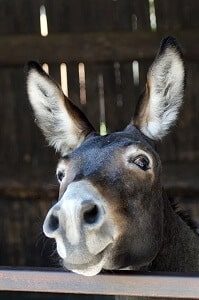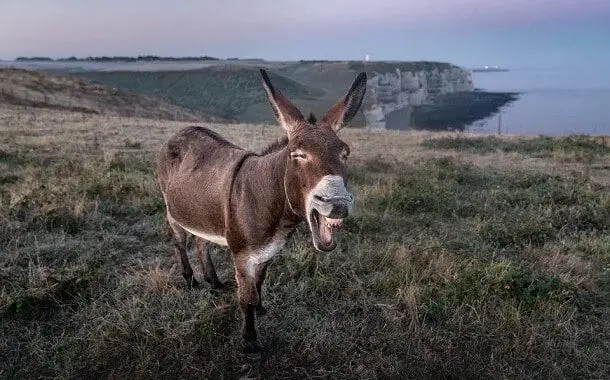How Much Does a Donkey Cost?
Last Updated on February 16, 2024
Written by CPA Alec Pow | Content Reviewed by ![]() CFA Alexander Popinker
CFA Alexander Popinker
Owning a donkey can be a rewarding experience, but like any pet or livestock animal, there are costs involved. This article breaks down the expected expenses so you can budget and prepare for donkey ownership.
We’ll cover everything from initial purchase price to monthly care and maintenance.
How Much Does a Donkey Cost?
The initial cost to acquire a donkey ranges between $500 and $15,000, depending on the animal’s breed, age, training, and purpose. On average, you can expect to pay:
- $500 – $2,000 for a standard or miniature donkey as a pet or companion animal. Adopted animals may be on the lower end of this range or cost a small adoption fee.
- $3,000 – $10,000 for a trained pack or work donkey. Show-quality or breeding stock can cost $10,000+.
- $5,000 – $15,000 for a trained saddle/riding donkey. Prices are higher for larger riding breeds.
Factors like the donkey’s lineage, confirmation, temperament, and skillset impact the price. Purchasing locally often costs less than having a donkey shipped.
Buying a younger donkey can be cheaper, but training and care costs will accumulate over its lifespan of 30-50 years. An older, trained donkey may be a better value.
BestFarmAnimals.com provides a detailed breakdown of the cost of purchasing and maintaining a donkey. It mentions that the pricing used in the article was mostly taken from Craigslist as a middle-of-the-road price range. The cost of donkeys depends on various factors such as size, age, coloring, gender, breeding, and training.
The article also discusses the region-specific variations in donkey prices, adoption fees, and the cost of consumables such as feed and bedding. It states that the cost of purchasing a donkey can vary from almost free to over $5,000, depending on numerous factors. The annual maintenance costs are estimated to range from $1,000 to over $2,500.
HorseRookie.com mentions that donkeys are relatively inexpensive compared to horses, as they consume a lot less. It advises having a “rainy day fund” for medical emergencies and states that donkeys are relatively easy keepers and are inexpensive to feed compared to horses and cattle. It also emphasizes the importance of considering the long-term commitment of owning a donkey.
Recurring Costs of Donkey Ownership
Caring for a donkey requires regular investments of time, labor, and money. Expect to budget approximately $1,500 – $5,000 per year for:
Feeding
- Hay and grains: $30 – $100 per month
- Salt/mineral licks: $10 – $20 per month
- Treats: $10 – $30 per month
The type and amount of food depend on the donkey’s size and workload. Proper nutrition is essential.
Housing
- Shelter: $500 – $5,000+ for construction costs if no stable exists
- Bedding: $20 – $50 per month
Donkeys need shelter from sun, wind, and precipitation. A simple three-sided shed can suffice in mild climates. Proper drainage and ventilation are key.
Healthcare
- Vaccinations and checkups: $200 – $500 annually
- Dental care: $100 – $300 annually
- Hoof trimming: Done every 6-10 weeks at $30 – $50 per trim
- Emergency veterinary fund: $500 – $1,000 in savings
Routine care contributes to long-term health and lifespan. Budgeting for illness and injury is also essential.
Grooming and Maintenance
- Brushes: $20 – $50 one-time cost
- Fly spray and coats: $50 – $150 per season
- Shears/clippers: $30 – $150 initially; blades sharpened for $10 – $20
Regular grooming and hoof care keep donkeys comfortable and healthy. Tackling tasks yourself saves on labor costs.
Additional Expenses
 Other costs may include:
Other costs may include:
- Tack and equipment: Halters, lead ropes, saddles, bridles, etc. can total $500 – $2,000+. Expect $100 – $500 in annual maintenance costs.
- Fencing: Materials and installation for safe enclosures cost around $2,000 – $5,000+.
- Insurance: For injuries or liability, annual premiums are $200 – $500 on average.
- Training: For riding or driving, professional training starts at $1,000 and up.
- Transportation: Trailering or shipping expenses if relocating.
Proper gear tailored to your donkey facilitates work, exercise, and handling.
Saving on Donkey Costs
Here are tips to curb donkey care expenses:
- Adopt from a rescue or sanctuary. The adoption fee is often under $500.
- Learn to handle regular hoof and health maintenance yourself.
- Provide adequate but economical shelter and bedding.
- Buy hay, feed, and supplies in bulk when possible.
- Use grazing or pasture boarding if available.
- Insure only as needed; not all owners choose to insure.
- Limit costs for specialty tack, show expenses, etc. if recreational use only.
With research and preparation, owning a donkey can be made affordable.
You might also like our articles about the cost of poneys, Akhal Teke horses, or the price to build a barn.
Legal and Ethical Considerations
- Check local zoning laws and requirements for housing livestock. Permits may be needed.
- Never allow overbreeding. Use ethical rescue options to find your donkey.
- Provide proper food, shelter, grooming, hoof care, and veterinary care at all times.
- Educate yourself on humane training methods and equipment.
Follow best practices for legal compliance and to ensure donkey health and welfare.
Final Words
The total cost of owning a donkey often ranges from $2,000 – $10,000 in initial purchase price and adoption fees. Then budget around $1,500 – $5,000 annually for care expenses.
Costs include feed, shelter/bedding, routine veterinary care, hoof maintenance, grooming tools, tack/equipment, and training.
With adequate research and preparation, donkey ownership can be very rewarding. Developing a bond with this charming equine gives great joy to animal lovers.
Can I Have a Donkey as a Pet?
Yes, donkeys can make wonderful pets and companion animals! Here’s what to know if you’re considering a donkey for a pet:
- Temperament – Donkeys are highly intelligent, affectionate, and can bond closely with owners when handled regularly. They are calmer and less flighty than horses.
- Space – Donkeys require adequate outdoor space to roam and graze. A minimum of 1-2 acres is ideal, though less can work with extra exercise. Shelter and safe fencing are also necessities.
- Social Needs – Donkeys are social herd animals and prefer having an equine companion, whether another donkey or horse. They can become distressed when isolated.
- Care – While quite self-sufficient when grazing, donkeys still need supplemental feeding, regular hoof trims, grooming, veterinary care, and oversite of their health.
- Handling – Donkeys respond best to patient, positive training. Treats help motivate them during handling, training, and exercise.
- Legal Check – Review your local zoning laws. Livestock may be prohibited in some residential areas without acreage. Permits may be required.
When their needs are met, many donkeys thrive as personable pets. Do ample research to make sure you can provide proper care. An equine-savvy vet can offer helpful guidance as well.
How Long Do Donkeys Live?
On average, donkeys live 30 to 50 years with proper care and nutrition. Here are some key factors in a donkey’s lifespan:
- Breed – Smaller miniature donkeys tend to have slightly longer lifespans, averaging 35-45 years. Larger draft donkeys live 25-35 years.
- Diet – Donkeys fed a balanced diet with adequate forage and limited treats/sugars are more likely to avoid obesity and associated health problems.
- Healthcare – Regular preventive care like dental exams, vaccinations, and hoof trimming contribute to longevity. Availability of veterinary care is crucial.
- Housing – Donkeys require shelter from weather extremes and clean, dry bedding. Good ventilation and drainage helps prevent respiratory issues.
- Exercise – Opportunity to roam and graze keeps donkeys physically fit. Obesity shortens lifespan.
- Workload – Donkeys used for riding, driving, or farm work should be limited to reasonable tasks for their age and health to prevent strain or injury.
- Social Bonds – Close bonds with human and/or animal companions contribute to a donkey’s emotional wellbeing.
Donkeys signal excellent care when they live into their late 30s, 40s, or even beyond 50 years old. Their long lifespans allow for decades of enjoyable companionship when properly maintained.
Do Donkeys Like Their Owners?
Yes, donkeys are very capable of forming close, affectionate bonds with human owners when handled gently and regularly. Here are signs a donkey likes you:
- It approaches you willingly in its space and follows you around.
- It displays gentle, playful behaviors like nibbling clothes or “grooming” you.
- Its ears point forward and it greets you with a bray when you enter its space.
- It allows petting, brushing, and handling during care without issue.
- It takes treats politely and responds to simple voice commands.
- It allows you to easily catch, halter, and lead it around.
Donkeys are intelligent and social. With consistent, positive interaction, they become comfortable with their owners.


Leave a Reply
Want to join the discussion?Feel free to contribute!